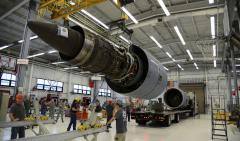Employers and Universities: Work with us?

A complete guide to aerospace engineering
It turns out a whole bunch of people want to know the difference between aerospace and aeronautical engineering!
Maybe you're one of those people, or maybe you've never heard of either - but if you like the sound of designing planes, rockets and space stations, this article's for you.
‘Want a career designing rockets, space stations or aeroplanes? Aerospace engineering could be your dream job’
This article answers the questions:
- What is the difference between aerospace and aeronautical engineering?
- What is aerospace engineering?
- What jobs are available in aerospace engineering?
- What qualifications do I need to become an aerospace engineer?
- What skills do I need for a career in aerospace engineering?
- What do aerospace engineers earn?
What is the difference between aerospace and aeronautical engineering?
Many people ask what the difference between aerospace and aeronautical engineering is. Aeronautical engineering is actually a type of aerospace engineering, which is split into two main areas:
- Aeronautical: Relates to machines that fly within the earth’s atmosphere, such as planes.
- Astronautical: Relates to spacecraft such as rockets, space stations and shuttles.
So what is aerospace engineering?
Aerospace engineers design and build machines that fly, from aeroplanes, gliders and helicopters to spacecraft, missiles and weapons. They design the parts and components that make up these machines, including engines, wings, landing gear and control systems. They also test the resilience, functionality and reliability of aircraft and their parts.
Check out this video to learn more about aerospace engineering:
If you’re a bit hazy about what engineering is in the first place, check out our Career Zone.
What qualifications do I need to become an aerospace engineer?
To work as an aerospace engineer, you will need a degree in aerospace engineering. In your degree, you will study fields such as aerodynamics, fluid mathematics, numerical and experimental methods, airframe design, solid mechanics, structural mechanics, flight testing and analysis and computer-aided engineering.
If you would like to become an astronautical engineer, you should choose modules which give you an understanding of spacecraft propulsion systems, solid and liquid-fuel rockets and ion drives.
Some universities offer a bachelor’s degree in the subject, giving you a BEng, although nowadays it is more common to study for a master’s degree or MEng, and/or complete a year in industry. University departments are often connected with employers in the field such as BAE Systems, Boeing and even the Ministry of Defence.
You can also do a five-year degree apprenticeship in aerospace engineering. You’ll work towards a BEng as well as NVQs at level 2 and 4 while working in a paid role as an aerospace engineer. Your first six months will be spent at college so you can learn the basics before you enter the workplace.
As an aerospace engineer, you will constantly retrain to keep up with advances in technology, materials and computer systems as well as government regulations.
To get on to a degree course or apprenticeship, you should study maths and physics.
What jobs are available in aerospace engineering?

Sometimes aerospace engineers work on site although most of the time
you'll be based in the office
Aerospace engineers can specialise in a number of fields, including:
- Design engineer: Come up with the outline and detailed designs of the product.
- Maintenance engineer: Improve and look after existing systems.
- Systems engineer: Make sure a whole set of different systems work together efficiently.
- Materials engineer: Develop, create and test new materials and groups of materials to improve the functioning and reliability of a product.
- Mechanical engineer: Design, make, test and improve machines.
What skills do I need for a career in aerospace engineering?
- Problem-solving: Engineers are professional problem solvers – aerospace engineers design solutions to the problem of fast, efficient flight.
- Logical thinking: Aerospace engineers need to be able to think in logical steps to design neat, efficient solutions.
- Time management: You will often work on multiple projects to strict deadlines, so will must be well-organised and able to complete tasks to a high standard on time.
- Computer-aided design (CAD): You will use computer system to design parts and aircraft, something you’ll learn on your degree course and/or in your job.
As well as these skills, you will need to understand health and safety legislation and any other regulations relating to aerospace engineering. You will gain this knowledge on your degree course or apprenticeship and through in-work training.
Where do aerospace engineers work?
Aerospace engineers often work for organisations like the Ministry of Defence, where they design, maintain and improve missiles, weapons and defence systems. The European Space Agency (ESA) – Europe’s version of NASA – also employ aerospace engineers, including astronautical engineers. Companies such as BAE Systems, Rolls-Royce, Boeing or Bombardier design aeroplanes, aircraft parts and weapons systems.
What do aerospace engineers earn?
According to the website Pay Scale, aerospace engineers in the UK earn an average of £32,917, although salaries range from £22,000 to £53,000.
If engineering sounds cool and you want to know if you’ve got what it takes, check out our article on what makes a good engineer.
Image credits
Lead image via US Defense website, Aerospace engineer via Wikimedia Commons
